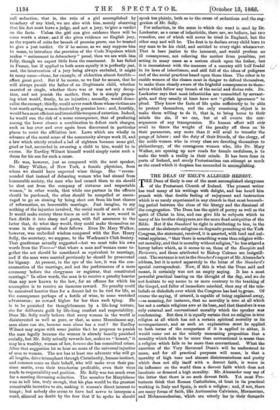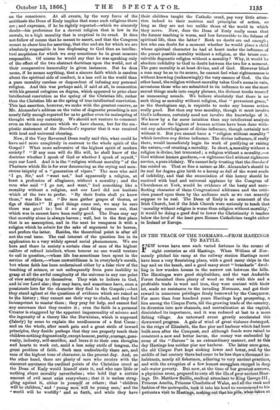THE DEAN OF EMLY'S ALLEGED ,HERESy.
THE Dean of Emly is one of the most accomplished clergyman of the Protestant Church of Ireland. The present writer has read many of his writings with delight, and •has heard him preach with that double feeling of enjoyment and instruction which is so rarely experienced in any church in that meet benumb- ing period between the close of the liturgy and the dismissal of the congregation. The Dean has the spirit of poetry as well as the spirit of Christ in him, and can give life to subjects which to many of his brother clergymen are the mere dead antiquities of the Bible. But if the Standard be right in attribatipg to him, in the course qf the elaborate eulogiuin ontlograatic preaching at the York Congress, the statement, received, it is asserted, with loud and mai- veraal applause, " that there is something worse than religion with- out morality, and that is morality without religion," he has Offered a heresy before which, ea it seems to us, those of the Essayists and Reviewers, and those attributed to Ilishop Colenso are insigpifi- cant. The sentence is not in the Standard's report of Mr. Alexander's address, but it is noted separately in the letter of the Standard's special correspondent. Now, if this is what the Dean said and meant, it certainly was not as empty saying. It has a most powerful practical bearing on the thought of the day, and we do not hesitate to say seems to us more contrary to the teaching of the Gospel, and fuller of immediate mischief, than any of the Oa- beliefs or disbeliefs over which the Congress has had to groan. Of course the saying, if uttered, is capable of being explained away, —as meaning, for instance, that no morality is true at all which has not a certain religious awe at its base, and that therefore it was only external and conventional morality which the speaker was condemning. •But then it is equally certain that no religion is true religion at all which has not a certain spiritual morality as its accompaniment, and as such an explanation must be applied to both terms of the comparison if it is applied to either, it would come out as the utterly unmeaning proposition that a morality which fails to be more than conventional is worse than a religion which fails to be more than conventional. What the assertion of the Very Reverend Dean's will be understood to mean, and for all practical purposes will mean, is that a morality of high tone and sincere disinterestedness and purity which does not ally itself with a devout faith, is worse in its influence on the world than a devout faith which does not inculcate or demand a high morality. Mr. Alexander may say of the latter that there is no suoh devout faith. Yet most Pro- testants think that Roman Catholicism, at least in its practical working in Italy and Spain, is such a religion ; and, if not, there are many forms of faith, like Antinomian Calvinism, Mormonism, and Mohammedanism, which are utterly lax in their demands
on the conscience. At all events, by the very force of the antithesis the Dean of Emly implies that some such religions there are ; and expresses, if he be rightly reported—which we sincerely doubt—his preference for a devout religion that is low in its morale, to a high morality that is sceptical in its creed. It does not follow of course that he meant to assert, and that the Congress meant to cheer him for asserting, that vice and sin for which we are absolutely responsible is less displeasing to God than an intellec- tual aeepticism lor which we may sometimes be in great measure responsible. Of course he would say that he was speaking only of the effect of the two abstract doctrines upon the world, not of their comparative immorality in given instances. But ha does mean, if he means anything, that a sincere faith which is careless about the spiritual side of conduct, is a less evil in the world than a pure morality careless or despondent of infusing any personal religion. And this was perhaps said, if said at all, in connection with his general eulogium on dogma, which appeared to prize clear intellectual conviction as the spring of the Christian life, rather than the Christian life as the spring of true intellectual conviction. This last assertion, however, we make with the greatest.reserve, as Mr. Alexander's address on the value of dogmatic preaching is not nearly fully enough reported for us to gather even its mainspring of thought with any certainty. We should not venture to comment even on the one sentence which we have chosen, but for the em- phatic statement of the Standard's reporter that it was received with loud and universal cheering.
Now, if the Very Reverend Dean really said this, what could he have said more completely in contrast to the whole spirit of the Gospel ? What more subversive of the highest spirit of modern .society? "If any man will do His will, he shall know of the -doctrine whether I speak of God or whether I speak of myself," says our Lord. And it is the `.'.religion without morality P of the Pharisees which ,Be is.for ever denouncing as-the crying and mon- „strolls iniquity of a ” generation of vipers." The man who said -41 go, Sir,' and " went not," had apparently a religion, at least a profession of allegiance, without a morality ; and the man who said "I go not, and went," had something like a ,morality without a religion, and our Lord did not hesitate which of the two to prefer. "By their fruits shall ye know
them," was His test. Do men gather grapes of thorns, or figs of thistles?" If good things come out, we may be sure there was good .in; but if no good thing comes out, that
which was in cannot been really good. The Dean may say that morality alone is always barren ; well, but in the first place that is an assumption, and in the next he eompares it with a religion which he admits for the sake of argument to be barren, and prefers the latter. Besides, the theoretical point is after all not the real issue. The real interest of the question lies in its application -to a very widely spread social phenomenon. We see -here and there in society a certain class of men of the highest -calibre of refined intellect, whose honour no one would venture to call in question,--whose life has sometimes been spent in the service of others,—.whose unworldliness is in everybody's mouth, but whose faith has been undermined either by a false view of the teaching of science, or not unfrequently from pure inability to grasp at all the awful complexity of the universe in any one point of view satisfying to themselves. They wish to ,believe in God, .and iriour Lord also ; they may • have, and sometimes have, even a passionate love for the character they find in the Gospels ; —but they stand aghast at the questions of evidence which are raised as to the history ; they cannot see their way to elude, and they feel incompetent to master them; they pray for help, and cannot feel -any assurance that they receive it ; even the-faith. in a personal 'Creator is staggered by the apparent impersonality of science and the ingenuity of a theory like the Darwinian, which is supposed (falsely) by some to explain the needlessness of a first Cause ; and on the whole, after much pain and a great strife of inward principles, they decide perhaps that they can properly teach their children nothing dogmatically, except honour, purity, courage, gene- roaity, industry, self-sacrifice, and leave it to their own thoughts and hearts to work out, amid a leas noisy strife of tongues, the great problem of faith. Such men undoubtedly the are, and men of the highest tone of, character, in thp present day. And, on the other hand, there are plenty of men who receive with the sincerest assurance the cardinal points of the Christian creed as the Dean of Emly would himself state it, and who care little or nothing about morality nevertheless ; who hold that a certain amount of evil must exist everywhere ; that it is useless strug- gling against it, either in yourself or others ; that children will be children,' and young men will be young men,' and the 4 world will be worldly' and so forth, and while they have
their children taught the Catholic creed, pay very little atten- tion iudeed to their motives and principles Of action, so long as they are not too unlike those of the world in which they move. Now, does the Dean of Enily really mean that the former teaching is worse, and less favourable to the fulness of spiritual life, than the latter Both no doubt are sad enough ; but who can doubt for a moment whether he would place a child whose spiritual character he had at heart under the influence of the purest possible morality without a religion, or the truest con- ceivable dogmatic religion without a morality? Why, it would be absolute infidelity to God to doubt between the two for a moment. The pure morality is at leant divine, and of God. However blind a man may be as to its source, he cannot -feel what righteousness is without, nowing (unknowingly) the very essence of God. On the. other hand, the religion without morality takes God's name in vain, accuatams those who are submitted to its influence to see the most sacred things made into empty phrases, the divinest truths treated as unmeaning sounds. We believe absolutely that there is no such thing as morality without religion, that " prevenient grace," as the theologians say, is requisite to make any human action really good. But then any true morality, though it must involve God's influence, certainly need not involve the knowledge of it. We know by a far surer intuition than any intellectual analysis that some of the highest of human actions have been done with- out any acknowledgment of divine influence, though certainly not without it. But you cannot have a " religion without. morality " 'which involves any divine influence. The divine influence, if really there, would immediately begin its work of purifying or raising the nature,--0 creating einerality. In short, &morality without a religion is divine, but truncated ; a religion, without a morality,--a God without human goodneas,—a righteous. God without righteous service, a pure idolatry. We cannot help trusting that the Standard has misled us. That so fine a nature as Mr. Alexander's should in its zeal for dogma give birth to a hereay so fall of the worst seeds of infidelity, and that the enunciation of this heresy should be received with lend and universal applause by the Congress of Churchmen at York, would be evidence of the hasty and unre- flecting character of theae.Congressional addresses and the criti- ciem passed upon them by the audience such as we can scarcely suppose to be real. The Dean of Epily is an ornament of the Irish Church, but if the Irish Church were seriously to teach that
morality without religion is worse than religion without morality,' it would be doing a good deal to lower the Christianity it teaches below the level of the least pure Boman Catholicism taught either in Ire1044 pr Europe.































 Previous page
Previous page